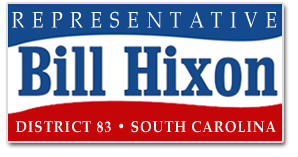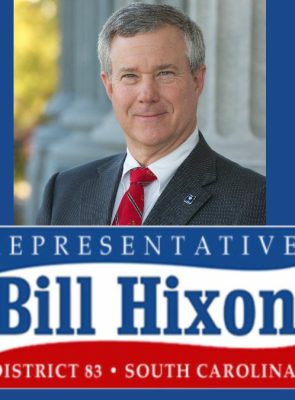Dear Friends,
 On Tuesday, January 14, 2014, the General Assembly returned to Columbia for the second half of our two-year term. Although a typically slow first week on the floor, we made significant progress on a notable Republican Caucus agenda item.
On Tuesday, January 14, 2014, the General Assembly returned to Columbia for the second half of our two-year term. Although a typically slow first week on the floor, we made significant progress on a notable Republican Caucus agenda item.
I hope that you find this update helpful and informative. If I can help you with an issue, please let me know. Thank you for reading and allowing me to serve you.
Remember if you have not already done so, to sign up for the free credit monitoring. Go to www.scidprotection.com and follow the steps to enroll or call them at (855) 880-2743 to enroll.
LEGISLATIVE UPDATE – January 27, 2014
Major Government Reform:
After more than a decade of effort by the House Republican majority, the House passed the biggest streamlining of state government in nearly three decades. We have approved this legislation five times in the past seven years, and other versions of it have been in the legislative pipeline since 2000.
A House-Senate Conference Committee signed off on a "Department of Administration" bill last week that moves the vast majority of the administrative functions of state government — human resources, information technology, state vehicles, and "general services"– under the control of the Governor for the first time. The bill also effectively eliminates the old Budget and Control Board.
The House leadership under two Speakers, four House Majority Leaders has worked with Governors Sanford and Haley to make this legislation a reality.
Other notable highlights of the compromise legislation:
- We prohibited any state agency from running a deficit unless it receives the explicit approval of the General Assembly. We whole-heartedly oppose any state agency running a deficit, but this window needs to stay cracked in case of the major state emergencies, natural disasters, or other unforseen calamites.
- We protected the state's AAA credit rating by creating two small, independent agencies (with a total of fewer than 200 employees) with broad decision making structures to ensure secure management of the state's fiduciary responsibilities. This includes bonding authority and the state auditor.
- The Office of the State Budget and the Board of Economic Advisors will be completely independent from the Governor's Office and the General Assembly. This will ensure politics does not play a role in effective budgeting.
- The General Assembly is required to review every state agency and every program on a five-year basis. While this is not the true "sunset panel" we have advocated for more than a decade, it is a step in the right direction for holding state bureaucrats accountable to the public.
School Safety Task Force:
The House of Representatives amended, approved, and sent to the Senate H.3365, a bill creating a School Safety Task Force. The task force will:
- examine the various funding streams for school based mental health services
- determine how the streams may be best utilized in order to provide for more accessible and efficient delivery of mental health programs
- examine school mental health staffing ratios
- provide suggestions regarding delivery of services and effective school-community partnerships
- develop standards for district-level policies to promote effective school discipline and mental health intervention
- examine how to best support multi-tiered systems of support
SC Military Service Integrity and Preservation Act:
 The House approved and sent to the Senate H.4259, the "South Carolina Military Service Integrity and Preservation Act". The legislation establishes a criminal penalty for someone who, with the intent of securing a tangible benefit, knowingly and falsely represents himself through a written or oral communication, including a resume, to have served in the Armed Forces of the United States or to have been awarded a decoration, medal, ribbon, or other device authorized by Congress or pursuant to federal law for the Armed Forces of the United States. A violation is a misdemeanor subject to a fine of up to $500 and/or imprisonment for up to 30 days.
The House approved and sent to the Senate H.4259, the "South Carolina Military Service Integrity and Preservation Act". The legislation establishes a criminal penalty for someone who, with the intent of securing a tangible benefit, knowingly and falsely represents himself through a written or oral communication, including a resume, to have served in the Armed Forces of the United States or to have been awarded a decoration, medal, ribbon, or other device authorized by Congress or pursuant to federal law for the Armed Forces of the United States. A violation is a misdemeanor subject to a fine of up to $500 and/or imprisonment for up to 30 days.Building Code Exemption for Historic Properties:
Law Enforcement Officer Post-Traumatic Stress Disorder:
The House approved and sent to the Senate H.3147, a bill establishing provisions for awarding workers' compensation to a law enforcement officer who sustains post-traumatic stress disorder from the use of deadly force in the line of duty. This legislation addresses a recent SC Supreme Court ruling that a police officer's post-traumatic stress disorder after a job-related fatal shooting of a suspect did not arise from extraordinary and unusual conditions of employment, as required for an award of workers' compensation payments for mental injuries. This legislation exempts a law enforcement officer seeking workers' compensation for personal injury caused by stress, mental injury or mental illness from meeting this extraordinary and usual conditions standard when the impairment causing the stress, mental injury, or mental illness arises from the law enforcement officer's direct involvement in, or subjection to, the use of deadly force in the line of duty.
Please be sure to stay up to date with all that is going on in Columbia. If you have any questions, comments or concerns, I am always available.



